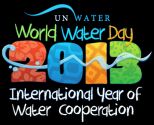 World Water Day is held annually on 22 March as a means of focusing attention on the importance of freshwater and advocating for the sustainable management of freshwater resources. An international day to celebrate freshwater was recommended at the 1992 United Nations Conference on Environment and Development (UNCED). The United Nations General Assembly responded by designating 22 March 1993 as the first World Water Day. Each year, World Water Day highlights a specific aspect of freshwater.
World Water Day is held annually on 22 March as a means of focusing attention on the importance of freshwater and advocating for the sustainable management of freshwater resources. An international day to celebrate freshwater was recommended at the 1992 United Nations Conference on Environment and Development (UNCED). The United Nations General Assembly responded by designating 22 March 1993 as the first World Water Day. Each year, World Water Day highlights a specific aspect of freshwater.2013 International Year of Water Cooperation.
In December 2010, following the proposal initiated by Tajikistan and submitted by a group of countries, the United Nations General Assembly declared 2013 as the United Nations International Year of Water Cooperation (Resolution A/RES/65/154).
The United Nations Educational, Scientific and Cultural Organisation (UNESCO) was appointed by UN-Water to lead the preparations for both the 2013 International Year of Water Cooperation and the World Water Day, in collaboration with the United Nations Economic Commission for Europe (UNECE) and with the support of the United Nations Department of Economic and Social Affairs (UNDESA), the UN-Water Decade Programme on Capacity Development (UNW-DPC) and the UN-Water Decade Programme on Advocacy and Communication (UNW-DPAC).
UN-Water has called upon UNESCO to lead the 2013 International Year of Water Cooperation in view of the organization’s multi-dimensional mandate in the realm of natural and social sciences, culture, education and communication, and its significant and long-standing contribution to the management of the world’s freshwater resources.
Water cooperation
The fulfilment of basic human needs, our environment, socio-economic development and poverty reduction are all heavily dependent on water.
Good management of water is especially challenging due to some of its unique characteristics: it is unevenly distributed in time and space, the hydrological cycle is highly complex and perturbations have multiple effects. Rapid urbanization, pollution and climate change threaten the resource while demands for water are increasing in order to satisfy the needs of a growing world population, now at over seven billion people, for food production, energy, industrial and domestic uses. Water is a shared resource and its management needs to take into account a wide variety of conflicting interests. This provides opportunities for cooperation among users.
In designating 2013 as the UN International Year of Water Cooperation, the UNGA recognizes that cooperation is essential to strike a balance between the different needs and priorities and share this precious resource equitably, using water as an instrument of peace. Promoting water cooperation implies an interdisciplinary approach bringing in cultural, educational and scientific factors, as well as religious, ethical, social, political, legal, institutional and economic dimensions.






